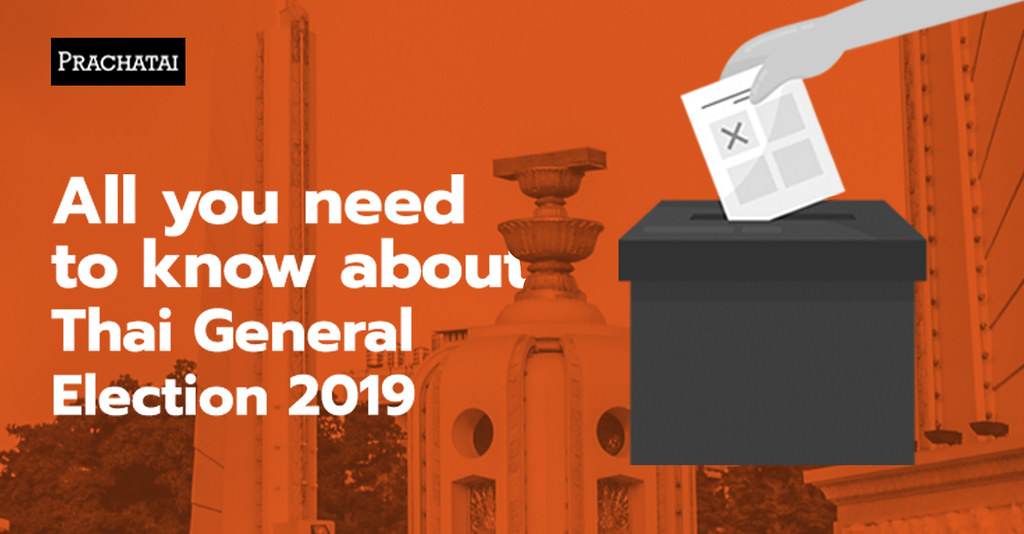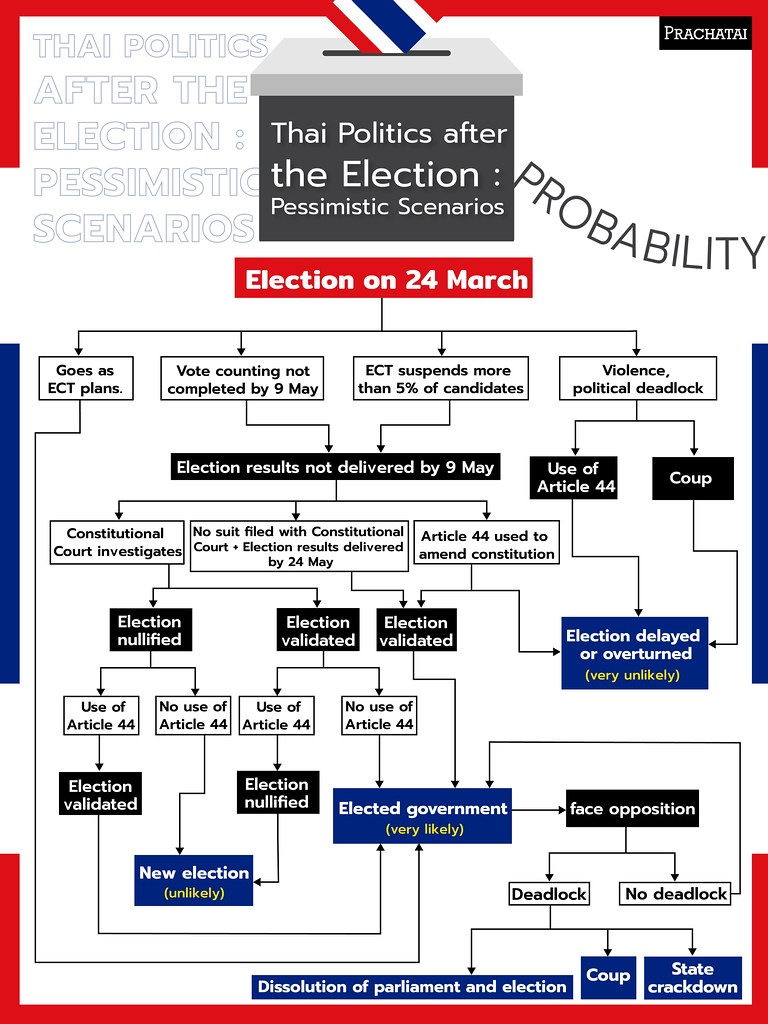
Here is an easy-to-understand guide to Thai General Election 2019 - beginning with the basics, followed by selection of answers to questions we have received. Send questions you think we should answer to [email protected].
What is the 2019 General Election?
The 2019 General Election is the first election after over 4 years of a military regime led by Prayut Chan-o-cha. After 6 delays, the Election Commission of Thailand (ECT) set the election for 24 March 2019 from 8 am to 5 pm. This election will decide the MPs and Prime Minister of Thailand.
Am I eligible to vote?
To be eligible to vote, you will have to be:
- a Thai national for at least five years.
- at least 18 years old on election day. Your date of birth has to be before 24 March 2001.
- not a monk, novice, incarcerated felon, person with a mental disorder or banned from elections as a penalty.
What if I am not available on 24 March?
There will be early voting day on 17 March, from 8 am to 5 pm. Registration for early voting will be from 28 January to 19 February 2019, the same as for overseas voting. To register for early voting, you will have to take information from your ID card and house registration, and fill out a form on the ECT website. A list of polling stations near you will be available on the website for you to choose.
If you didn't make it to register for early voting by 24 February and will not be able to cast your vote on 24 March, you can inform the authorities about your absence 7 days before or after the election date to ensure that your rights are not suspended.
The conditions that allow your absence are:
1. urgent business to attend to
2. being sick, disabled, or too old to cast a vote
3. being in a foreign country
4. living more than 200 km away from the polling station
5. other emergency cases that Election Commission of Thailand has not specified.
If you fit into one of these cases, your will have to complete a "Sor Sor 28" form and prepare documents proving the reason for your absence. You must submit your documents either to the District registrar or the local registrar for your registered address. You can do this by person, by mail, or have someone deliver for you.
If you are absent without informing the authorities, certain rights will be suspended. You will get these rights back the next time you vote in an election. All are rights concerning positions in political office:
1. Right to submit an appeal against the election of MPs, senators, members of local councils and local administrators.
2. Right to stand for election as a candidate for MP, senator, member of a local council or local administrator.
3. Right to be a village or subdistrict head (กำนันผู้ใหญ่บ้าน).
4. Right to hold the position of political official or parliamentary official.
5. Right to hold the position of deputy local administrator, secretary or deputy secretary of a local administrator, chief advisor to a local administrator, advisor to a local administrator, or member of an advisory body to a local administrator.
What if I am abroad during the election?
Registration for overseas voting will be from 28 January until midnight of 19 February 2019. To register for overseas voting, you will have to take information from your ID card and house registration, and fill out a form on the ECT website.
There will be voting for Thai citizens abroad on 4-16 March arranged by Thai embassies and consulates. To learn the specific time and place of voting in the foreign country where you are, you will have to make a phone call to the Thai embassy or a consulate in that country or follow announcements from their websites.
When will I know the election results?
You will know by 9 May 2019. The constitution says that the ECT must deliver 95% of the election results within 150 days after the organic law on election came into force on 11 December 2018. To prevent legal complications, the ECT plans to announce the election results by then.
How can I know where to vote on 24 March?
The Election Commission will mail information about voters’ polling stations to their registered home addresses within 20 days of the election. You can also check names and the location of polling stations in advance on the official site www.khonthai.com.
What is the single-ballot system?
In all previous elections since 1997, each Thai voter was provided with two ballot papers. One for party list MP candidates, and another for the constituency MP candidates. However, there has been a change this time.
The 2016 constitution, drafted by the NCPO-appointed Constitution Drafting Committee and approved in a national referendum, specifies a single-ballot system, with a single vote for the two types of MP. In constituency elections, the winner is still decided in a first-past-the-post system. But the party-list system requires a more sophisticated calculation, since voters have no direct way to elect party-list MPs of the political party of their choice. Here is how the calculation works:
- All votes cast is divided by a total number of members of Parliament (500). The result is a fictional number of votes required per MP. As far as we can guess, the approximate number would be 60,000-70,000 votes per MP.
- The total number of votes gained by constituency candidates of a party, both these who won seats and those who didn’t, is then divided by the fictional number of votes required per MP (estimated at 60,000-70,000) The result represents the number of MPs each party ’ought to’ get. For example, if Party A gets 2 million votes from all its candidates in all constituencies, it ‘ought to’ get a total of (2,000,000 ÷ 70,000 =) 28 MPs in the Parliament.
- But that number includes the number of MPs already won in constituency elections, so the number of constituency MPs has to be subtracted to give the number of party-list MPs elected. For example, if Party A ‘ought to’ get 28 MPs, but has already got 20 constituency MPs, it will get (28 – 20 =) 8 party-list MPs.
- It can get even more complicated. It is possible that a party could gain more constituency MPs that its total votes say it ‘ought to’ get. In this case, that party will get no party-list MPs and the number of party-list MPs for all other parties will be adjusted on a proportional basis.
This system gives an advantage to middle-sized parties big enough to have the resources to run MP candidates in many constituencies but not big enough to expect many successful candidates. With mostly losing votes from all over the country, they can expect to pick up a substantial number of party-list candidates. Big parties can expect to win in many constituencies, but the large number of constituency MPs will reduce the number of party-list MPs it can expect.
However, biggest losers are small parties. Since they do not have the resources to run MP candidates in constituency elections, they have less chance to gain either constituency MPs or party-list MPs.
If you look at voting systems around the world, this system is extremely unusual. It may be no coincidence that whenever in the past, an outgoing coup government has tried to form a political party, it has normally been a middle-sized party.
What is meant by an outsider Prime Minister?
An outsider Prime Minister is a Prime Minister who is a not a Member of Parliament. According to the 2017 Constitution, political parties may nominate a list of up to 3 Prime Minister candidates before the election. Citizens will be informed of the candidates before they cast a vote, but the constitution also allows a majority of the House of Representatives (250 votes) to propose a PM candidate other than those on the list. With approval of two-thirds of Parliament (500 out of 750 votes of elected MPs and appointed senators combined), an outsider Prime Minister of Thailand can be proposed without any participation from citizens.
Why is the Senate appointed?
One explanation is that it helps the junta to have a head start. According to the 2017 Constitution, the Senate will consist of 250 members appointed by the King on the recommendation of the Prayut-led NCPO government.
During the first 5 years of the 2017 constitution, the Senate also has a say in voting for the Prime Minister. With the votes of 250 non-elected senators, Prayut Chan-o-cha will need to secure only 126 votes from MPs to earn a majority of Parliament and become Prime Minister.
In contemporary Thai political history, parties associated with Thaksin Shinawatra have won every election since 2001, but this time they will face an uphill battle. To win this election, their coalition may need to win 376 MPs.
How many Prime Minister candidates are male, female, and LGBT?
Of the 69 candidates for Prime Minister, 61 are men, 7 are women, and 1 is transgender. Palinee “Pauline” Ngarmpring is the only transgender candidate. If she is elected, Pauline will also become the world’s first transgender Prime Minister.
Is it possible that General Election results will be overturned?
It is possible, but very unlikely. Contemporary Thai political history shows that overturning or postponing elections happens quite often. For instance, the Constitutional Court dissolved the elected People’s Power Party in 2008, paving the way for a government under the Democrats, who had lost the 2007 election. A mob obstructed the election in 2014. The coup followed, and promised an election that was postponed 6 times. Chaos, violence or political deadlock may lead to a ‘double-dip’ coup.
Today, the NCPO still has Section 44 at its disposal, giving it absolute legal power to do anything, even though they are constrained by other factors. The organic law also contradicts the constitution as it says that the 150-day timeframe applies to holding the election only, not also announcing the results. Unless the election result can be made official on 9 May 2019, the constitutional court or NCPO may intervene to rule if the election is unconstitutional.
However, many parties have started campaigning, including the Phalang Pracharat Party which has officially invited Prayut Chan-o-cha to be its PM candidate. This kind of path dependence increases the cost of delaying or nullifying election results. Also, the coronation will be held on 4-6 May 2019. Postponement or nullification of the election will cause a negative atmosphere around coronation day. Therefore, it is most likely that the election will be successfully completed as planned.
Here is a diagram of probability:

Related:
- 9 judges will decide the fate of Thai General Election
- Dissolve any party and we still won’t vote for you: reactions to the dissolution of the Thai Raksa Chart Party
What if I have more questions?
Just ask! Send your questions to [email protected] or by any channel you think you can reach us.

Since 2007, Prachatai English has been covering underreported issues in Thailand, especially about democratization and human rights, despite the risk and pressure from the law and the authorities. However, with only 2 full-time reporters and increasing annual operating costs, keeping our work going is a challenge. Your support will ensure we stay a professional media source and be able to expand our team to meet the challenges and deliver timely and in-depth reporting.
• Simple steps to support Prachatai English
1. Bank transfer to account “โครงการหนังสือพิมพ์อินเทอร์เน็ต ประชาไท” or “Prachatai Online Newspaper” 091-0-21689-4, Krungthai Bank
2. Or, Transfer money via Paypal, to e-mail address: [email protected], please leave a comment on the transaction as “For Prachatai English”
